Small Shops
 Emboldened Entrepreneurship
Emboldened Entrepreneurship
Having written articles and editorials, including publications such as the Kansas City Star, the Atlanta Journal-Constitution and Wall Street Journal’s online WSJ Market Watch, BV parent Laura McKnight is the Director of Practice Development of Creative Planning at Embolden, a local publishing company.
People like McKnight who own businesses in local areas can adapt to changes at a faster and more efficient pace. This allows for giving more opportunities to individuals who may be overlooked by large companies or ineffective human resources.
“When you think about business, a lot of people only think about the big companies,” she said. “In fact, our economy is very dependent on small businesses being successful because they employ people and they also provide a lot of the goods and services that we need in our society.”
McKnight, who is the mother of freshman Eva Barker and junior Lindy Barker, used the advantages of the internet to gain possibilities at the beginning of her small business journey.
“I started researching and [worked] to figure out what it would take to not only write a book but also pay for it to get printed
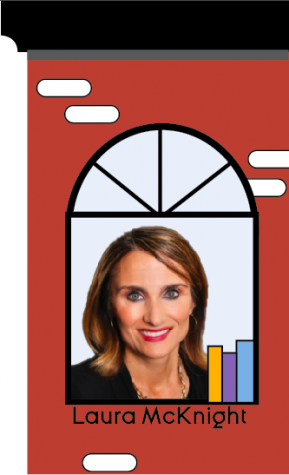
and how to sell it online through Amazon and Barnes and Noble,” she said.
When McKnight aspired to start her job in publishing in 2012, she began her very own publishing company named Embolden.
“I [wrote my first book] because I wanted to get into the business — I knew that if I had a book, it could really help me with that,” she said. “The company [helps] foundations across the country with their marketing by creating materials they can buy online so they don’t have to write the materials themselves.”
McKnight said owning a small business has changed her outlook on the world.
“I really have a huge admiration for people who start businesses with their own money because it’s really hard and it’s easy to take for granted when you just get a paycheck,” she said. “When you have your own business and you’re the one writing paychecks for other people, it really makes you appreciate much more.”
Embolden’s digital technology enables the business to move smoothly.
“It makes things a lot faster,” she said. “If you’re smart about it, it can make it cheaper.”
McKnight wants to make sure that it’s easier for people to find out how to publish books.
“There’s still a lot of misinformation out there,” she said. “I think people waste a lot of time and money because they just don’t know how to begin [an entrepreneurship].”
For students interested in entering publishing in the future, McKnight suggested keeping an eye on the ever-evolving field.
“Pay attention to how publishing is changing to get a good historical perspective,” she said. “Also pay
really close attention as it changes year-to-year because it creates opportunities.”
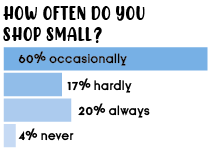
Knives Out
Spencer Marquardt, father of sophomore Carson Marquardt,is one of the owners and founders of Finch Knife Co., a small business specializing in handcrafted pocket knives. Marquardt began making knives with Finch in 2019. Since then, he has learned a lot about owning and operating a small business.
“My business requires me to have many different responsibilities — I need to have an understanding of finance, marketing, management, manufacturing and customer service,” Marquardt said. “I enjoy owning a small business because I get plenty of opportunities to manage scenarios in all of these disciplines.”
Because of the impact it can have on a business, Marquardt is attentive to the news.
“It is important for me to keep up with current events around the world,” Marquardt said. “I work with factories in Asia and have to coordinate with shipping companies to have my products exported out of the country of origin and into the U.S. We have to pay import taxes on everything we bring into the U.S.”
Marquardt describes the significance of local businesses as the backbone of the American economy.
“Small and family-owned businesses provide a level of service that is more personal [and] are [an] important part of their communities,” Marquardt said. “[It gives me a] strong sense of pride, independence [and] strong
work ethic.”
Unlike other companies, Finch Knife Co. has not been impacted by the coronavirus.
“All of my products are sold online either directly from my website or through our network of dealers,” Marquardt said. “My products are priced strategically that [even] during a down economy, our customers are still wanting and needing our products.”
For students interested in starting a business, Marquardt advocates to trust themselves and their cl
ients.
“Don’t worry about making mistakes because they are inevitable — learn from your mistakes and quickly move on,” Marquardt said. “It’s all about the customer. We exist because of the customer, so take care of them. Don’t be afraid to take risks. If you believe in your product or service, others will too.”
Crafting a Company
As someone who’s always loved shopping small and being creative, it was no surprise when a BV sophomore decided to open her own small business, Decals by Abby Taylor.
“[My favorite part] is just making the products,” Taylor said. “It’s such a creative process, and it’s really fun to just sit down and be creative and work with my hands.”
Although it began as just a small sticker account, she utilized her spare time over quarantine to revamp her account and expand her variety of products.
“I sell custom stickers and decals,” she said. “I also have ornaments, hand-knit yarn keychains and canvas banners that have cute messages on them.”
Having a small business has given Taylor the opportunity to meet new people and collaborate with several organizations.
“One of my favorite things was making the cheers stickers because usually I wouldn’t get to do that,” she said. “I also made ornaments for my dad’s work — that was really fun.”
Taylor said buying from local businesses is equally as rewarding on the other side.
“Shopping small gives you and the owner a bigger satisfaction — you’re not just contributing to a big million-dollar corporation, you’re helping one person,”
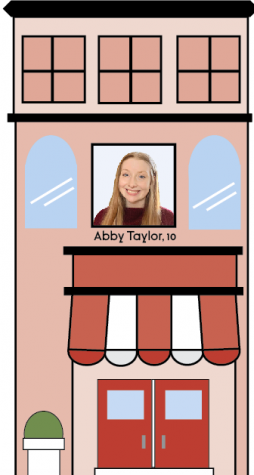
Taylor said. “Most of the time you get to know that person really well. You can see their personality and how they’re
impacted by it.”
Being a business owner has given Taylor a way to apply the knowledge she has gained through courses at BV.
“It’s given me more chances to use my creativity for a bigger purpose than just for myself,” Taylor said. “It’s taught me good social media skills, and I feel like I’ve gotten better at Canva and the other programs that I use. It gives me a bigger thing to focus my time on outside of everything else.”
Having created her business during the pandemic, Taylor was not forced to adjust as greatly compared to other local shops. Yet, she still experiences challenges.
“Although I still do some face-to-face deliveries, some of them I’ve had to set out in a little box and they’ll come pick it up,” Taylor said. “I also do a lot of Venmo. It’s easier than paying cash and handing it off.”
Taylor hopes to continue being a small business owner into the future and possibly expanding it with time.
“Right now, I like how small it is because I don’t have to worry about shipping, but I’m really open to moving toward Etsy,” she said.
Taylor finds this creative outlet to be a great place to focus her time outside of school and in other aspects of her life.
I AM Local Business
All around town, businesses — ranging from clothing stores, to cafes, to restaurants — fill the streets and shopping corners and are owned by a variety of people.
One small business that has made its mark over the last few years, is run by senior Carissa Hamilton and her family.
During December 2018, the Hamiltons partnered with another local business owner, Ann Riensin-Piyapant, to open I AM Frozen Dessert Cafe.
“The whole concept is super popular in Thailand, and it’s never been done in Kansas,” she said. “We thought it would be unique to bring it her.”
Hamilton quickly learned owning a business is harder than people think.
“My mindset has definitely changed,” she said. “I realized that not everything is as easy as it looks and that it takes a lot of effort.”
While the constant hard work may seem tiring at times, Hamilton has been able to take away an exorbitant amount from this experience.
“I get the opportunity to learn a lot about business which is good because that’s what I want to get into,” Hamilton said. “I’ve also been able to learn and work with certain people to help me grow.”
While some may think owning a local business comes with fewer challenges, the reality is quite the opposite, as Hamilton’s mother, Mullika Hamilton, explains.
“You have a lot of responsibilities that revolve around every aspect of the business,” Mullika said. “You are constantly looking for ways to improve how you interact with customers, how you motivate, train and retain staff and how you cut cost without sacrificing quality.”
Now more than ever, small businesses have taken a major hit. The past year with COVID-19 has set new cha

llenges for the Hamilton family.
“When the pandemic first started, we had to pause for a bit,” Mullika said. “Then, once things were able to open back up, we started doing to-go orders. It’s just starting to get back to how it was before COVID.”
Despite the loss of business over certain stages in the past year, the Hamilton family has learned to grow and work even harder than before. It has given them and many business owners a chance to change their perspective on what they have.
“I’ve learned that it is going to be hard at times,” Carissa said. “It won’t always be the best experience, but you just hav
e to put in more effort so that it stays alive.”
Understanding how to adapt to new situations and reinvent a concept on the fly was something the Hamiltons learned at an early stage.
“Finding new ways of servicing customers through new contact points and new products while still maintaining the identity of your business is key,” Mullika said.
Owning a business, the Hamilton family has learned first-hand the importance of shopping small.
“Shopping local ensures a stronger local economy,” Mullika said. “It’s not as though non-local businesses don’t hire local or source local, it’s just that a vast majority of the money does not stay local.”
As her family continues to recover from the pandemic, Carissa hopes to take what she’s learned from her family’s business and build something of her own.
“In the future, I would like to open a small business,” Carissa said. “It would mean so much to me.”
Business Tomorrow
With the years flying by, several local shops open their doors — inspiring teenagers to take part in their own way.
For students interested in creating their own line of work, business teacher Kathy Peres recommends the entrepreneurship course.
“One of the things we help students do in class is actually develop a business plan,” Peres said. “What that does is forces them to think through all of those key things that would need to be done in order to get their business running — an amount of money they’re going to need to come up with in order to start their business, their vendors, what type of marketing needs to be done, [starting] that business on their own as a sole proprietor or [grabbing] a partner.”

In spite of the difficulties in creating a start-up, Peres notes some students have found triumph in their own journey of entrepreneurship.
“We have students who started a quick lawn-mowing business — something like that is fairly easy to start,” Peres said. “While we are very fortunate that [our school’s coffee shop is] under the umbrella of school, if [an individual were] to start a small business like a coffee shop, there would have been a lot more that would have went into it.”
While small businesses are gaining popularity, Peres believes more support is still necessary for these people to be truly successful.
“If we want those businesses around and we want that local, family owned businesses feel, we have to support them and not drive through Chick-fil-A just because we love Chick-fil-A,” Peres said. “Branch out and try a small business that [you’ve] never tried before. Any community needs to do that if they want to have more options.”
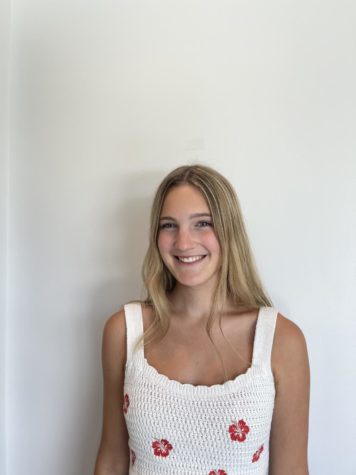
Brynn Friesen is a senior and is Web Editor of the newspaper. This is her fourth year on staff. She is also co President of the choir department. Brynn...
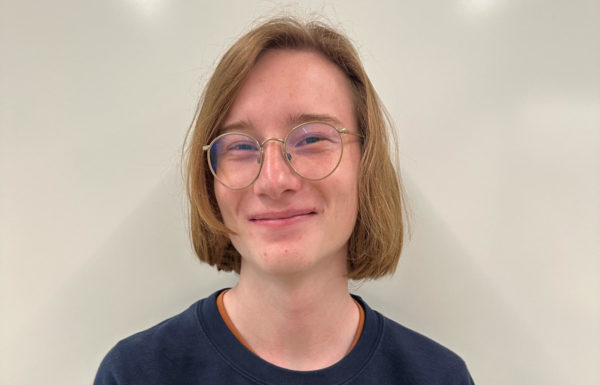
Isaac Hudson is a senior and one of the editors-in-chief this year. It is his fourth year on staff. He is also the president of BV’s Latin Club, and...

Ayesha Khan is a senior and is Editor-in-Chief. This is her third year on staff. She is also a captain on the Tigerette Dance Team and dances competitively...

Erika Kolseth is a senior, and this is her third year on the newspaper staff. She loves thrift shopping, writing music, playing piano and guitar, and...

Liya Patel is a senior this year and is starting her third year on staff. She enjoys spending time with her friends and family and loves to go on drives...

Mia Rice is a senior and this year is her second one on staff. Her interests include drawing, giggling, and watching movies. She loves to apply...
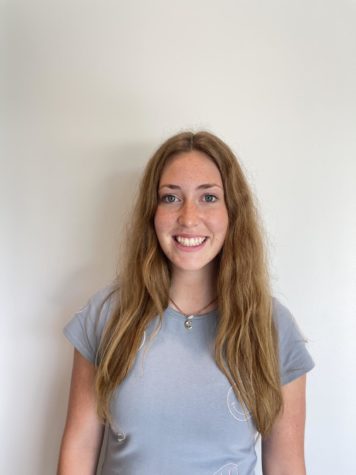
Charley Thomas is a senior and serves as Editor-in-Chief of the Tiger Print this year. At BV, she is a member of the Varsity Volleyball Team, Student Council,...
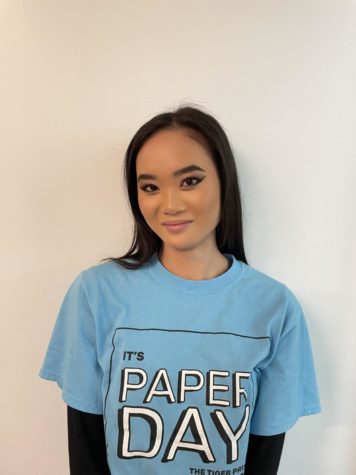
Mena Walker is a senior and this is her second year on staff. In school, she’s involved in NHS, Varsity Tennis, Galley Club, and Book Club. She is...



